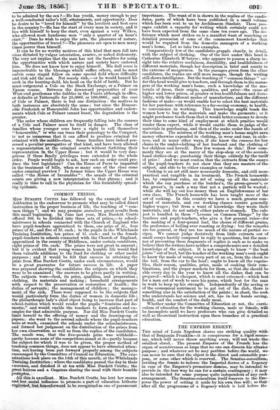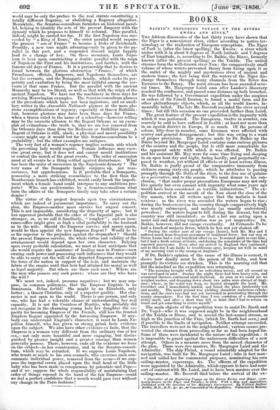THE EMPRESS REGENT; Time mind of Louis• Napoleon shares one
striking quality with that of Benja.min Frankhn—it is conspicuous for a, rigid econo- my, whichwill• never throw anything away, will not waste the smallest shred.. The present Emperor of the French has the organ of secretiveness so large that no one can discern his ulterior purpose ; and whatever act he may perfdrm before the world, we can never be sure that the object is the direct and ostensible pur- pose, or some other which-is reserved. The Senatus-consultiun, inviting the Senate to indorse. the Imperial decree of a Regency in-case-of of the Emperor's premature demise, may be intended to provide in the best way he can for a certain contingency ; it may also be intended for some purpose quite independent of any such arrangement. The Senatus-eonsultinn itself reserves to the Em. peror the power of setting it aside by his own free will ; so that after all the programme of a Regency which is laid before the
world may be only the preface to the real statute constituting a totally different Regency, or abolishing a Regency altogether. Meanwhile, the • Senatus-consultum furnishes an historical paral- lel, helping to identify the acts of the present Emperor with the dynasty which he proposes to himself to refound. This parallel, indeed, might be earned too far. If the first Napoleon was suc- ceeded by " a King of Rome," the strict parallel would require the present " son of France " to become a Duke of Reichstadt. Possibly, a new tone might advantageously be given to the pa- rallel in this part, and a suspended discord might happily lead to a change of key. On these occasions, Louis Napo- leon is bent upon constructing a double parallel with the reign of Napoleon the First and his institutions, and further, with the famous old days of France. It is a partnership that he desires to found between the glorious abstraction "France," of which Frenchmen, officials, Emperors, and Napoleons themselves, are but the servants, and the Bonaparte family, which seeks its per- petuity and exaltation by being the most faithful among the ser- vants of that same France. But the parallel with the ancient Monarchy may be too literal, as well as that with the reign of the ancient Napoleon. We have not the machinery in these days for reviving Merovingian examples. The Senatus-consultum glances at the precedents which have not been inglorious, and an ancil- lary writer in the Assemblee Nationale glances at the more glo- rious exemplifications of regency, especiallY at Queen Bathilda. : but, however glorious may have been those days for France, when a Queen ruled in the name of a schoolboy—however telling may be the sarcastic allusion to the Regent Orleans as an exem- plar ad evitandum—the truth is, that we are less removed from the Orleanic days than from the Medicean or Bathildar ages. A Regent of Orleans is still, alack, a physical and moral possibility —some might say it would but for this Senatus-consultum be a probability ; but the other examples are antiques.
The very. fact of a woman's regency implies certain aids which the governing lady would require. Female influence may exer- cise great sway, but it does not and cannot mould institutions or control the march of the great events. The order of succession must at all events be a thing settled against disturbance. What has been the order of succession in the Napoleonic dynasty ? The very name of the Bonaparte family conjures up, not reas- surances, but apprehensions. Is it probable that a Bonaparte, possessing a more striking resemblance to the first than the Beauharnais branch has exhibited, would easily brook the impedi- ment which a female hand could interpose to any ambitious pro- jects? Who can predetermine by a Senatus-eonsultum what turn the affairs of the Bonaparte family may take after a certain demise ?
The virtue of the project depends upon two circumstances, which are indeed of paramount importance. To carry out the plan, the Empress-mother must survive her august consort.
is not impossible, considering the disparity of ages ; but it has appeared probable that the elder of the Imperial pair is also stronger or, as we call it familiarly, " tougher ; and an insu- rance-office might give as high a vital probability to the husband as to the wife. Should the Emperor survive and marry again, would he then appoint the new Empress Regent ? Would he be so far superior to the prejudice against the stepmother ? Should the present Empress survive, the whole virtue and validity of the arrangement would depend upon her own character. Relying upon every probable calculation, we must at least anticipate that she would require the assistance of leading men in France—men owning such power and possessing such influences that they would be able to carry out the will of the departed Emperor, concentrate the force of the nation in support of the heir, and maintain the fabric of the empire until that heir had attained his moral as well as legal majority. But where are there such men ? Where are the men who possess any such power; where are they who have the will ?
. We must not, indeed, presume negatives ; but we may sup- pose, in common politeness, that the Empress Eugenie is no Semiramis. Belus forbid! She might be an Elizabeth, only better ; a Queen Christina, only of a superior quality. Her cha- racter is not open to the world. There is one person, and only one, who has had a tolerable chance of understanding her real capacity. It is not the Countess of Montijo, who probably did not recognize in the charming young lady her daughter the ca- pacity for becoming Empress of the French, still less the trusted Rn,press Regent appointed by the foreseeing Emperor. If any- body can understand Eugenie s character, it must be Louis Na- poleon himself, who has given us strong prima facie evidence u n the subject. We also have other evidence ex facie, that the
press is a woman very different from the ordinary run of her sex,—not only more beautiful and more engaging, but distin- guished by greater insight and a greater courage than women generally possess. There, however, ends all the evidence we have on the subject—in her countenance, and in the Senatus-consul- tum, which may be retrabted. If we suppose Louis Napoleon, who trusts so much to his own counsels, who exercises such con- summate individual power, removed from the scene—if we sup- pose the imperial crown placed upon the frail head of the little baby who has been made so conspicuous by potentate and Pope— and if we suppose the whole responsibility of maintaining that order of things reposed in the hand of the fair Empress—could. we feel a perfect confidence that a month would pass over without any change in the Paris fashions ?



























 Previous page
Previous page